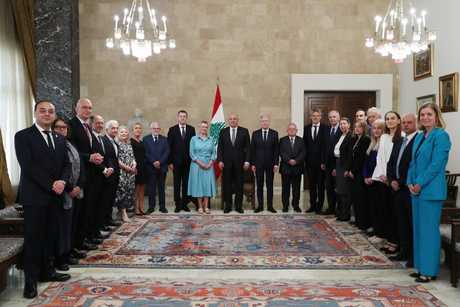EU and European ambassadors discuss priorities and $600M support with Lebanese Leadership

EU and member state ambassadors met with President Joseph Aoun, Prime Minister Nawaf Salam and Parliament Speaker Nabih Berri on respectively 10, 11, and 17 July 2025, the EU Delegation to Lebanon said.
During these meetings, the ambassadors underscored the EU and its member states’ “substantial and ongoing support for Lebanon, including in conflict-affected areas across the country,” a statement said.
The EU and its member states current funding in those areas amounts to more than USD 600 million, representing nearly half of their ongoing engagement in Lebanon which stands at over USD 1 billion.
Beyond humanitarian assistance, the majority of this funding supports critical sectors such as education, healthcare, social protection, water and sanitation, and agriculture, while also contributing to economic recovery through job creation and private sector support.
Additional funding is also allocated to help mitigate the impact of the conflict on the security and stability of the country, including by supporting the Lebanese Armed Forces’ capabilities and deployment in the south, clearing rubble and unexploded ordnance, and strengthening border management. A significant part of that support is not included in the USD 600 million.
In this context, the ambassadors highlighted “the crucial role of UNIFIL in maintaining stability and security in the south, a role that remains indispensable in the future.”
They emphasized the “utmost need for all parties to fully implement U.N. Security Council Resolution 1701, including ensuring a state monopoly on arms, and to abide by the November 2024 ceasefire mechanism.”
The ambassadors also discussed with their interlocutors the government’s “commitment and plans for the much-needed financial, judicial, and governance reforms that can place the country on the path to recovery.”
They also commended the authorities on “the steps taken since the beginning of the year, including Parliament’s approval of the Banking Secrecy Law and the filling of key vacancies in the judiciary and regulatory authorities, among others.”
Moreover, the Ambassadors stressed the need for parliament to swiftly endorse a Bank Resolution Law that meets international standards. They similarly called on the Government to urgently draft and adopt a comprehensive strategy for the distribution of financial sector losses (the so-called "GAP Law"), in a way that ensures clarity, fairness, and alignment with international best practices.
They additionally inquired about the status of the law on the independence of the judiciary and the new media law that should serve to uphold media freedoms and to strengthen accountability.
The ambassadors concluded by reiterating to President Aoun, Prime Minister Salam and Speaker Berri the EU and member states’ “commitment to Lebanon and their willingness to support the country as it moves forward.”



